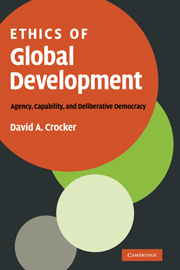Book contents
- Frontmatter
- Contents
- List of figures
- Acknowledgments
- 1 Introduction
- Part I Development ethics
- Part II The capability approach: ethical foundations
- 4 Critique of alternatives
- 5 Agency, functioning, and capability
- 6 Evaluating capabilities and functionings
- Part III Strengthening and applying the capability approach
- Part IV Deliberative democracy, participation, and globalization
- Index of names
- Index of subjects
5 - Agency, functioning, and capability
Published online by Cambridge University Press: 22 September 2009
- Frontmatter
- Contents
- List of figures
- Acknowledgments
- 1 Introduction
- Part I Development ethics
- Part II The capability approach: ethical foundations
- 4 Critique of alternatives
- 5 Agency, functioning, and capability
- 6 Evaluating capabilities and functionings
- Part III Strengthening and applying the capability approach
- Part IV Deliberative democracy, participation, and globalization
- Index of names
- Index of subjects
Summary
Having examined Sen's and Nussbaum's assessments of alternative ethical approaches to development, we are in a position in the present chapter to analyze and evaluate the fundamental concepts in their respective ethical outlooks. A fundamental and often underemphasized or completely neglected distinction in Sen's ethic is that between agency, which includes both agency freedom and agency achievement, and well-being, which includes both capability and functioning. In the first section I explain the distinction between agency and well-being and the cross-cutting distinction of achievement and freedom. After analyzing and evaluating the evolution of Sen's concept of agency from an empirical concept of human motivation to an ethical ideal of autonomy and action, I argue that Nussbaum's concepts of practical reason and control are both less robust and less defensible than Sen's ideal of agency. In the second section I analyze, compare, and evaluate Sen's and Nussbaum's concepts of functioning and capability and the different roles these concepts play in their respective normative outlooks. In the next chapter I analyze and evaluate differences that have emerged with respect to Sen's and Nussbaum's favored ways of evaluating capabilities and functionings.
Agency and well-being, freedom and achievement
Central to the normative “foundation” of Sen's development ethic are two cross-cutting distinctions: (1) agency and well-being, and (2) achievement and freedom. With the help of Figure 5.1, I explain the basic ideas.
- Type
- Chapter
- Information
- Ethics of Global DevelopmentAgency, Capability, and Deliberative Democracy, pp. 150 - 184Publisher: Cambridge University PressPrint publication year: 2008
- 3
- Cited by

